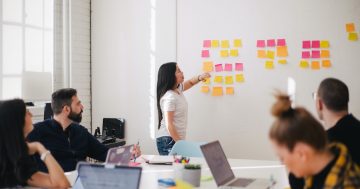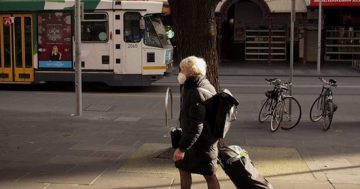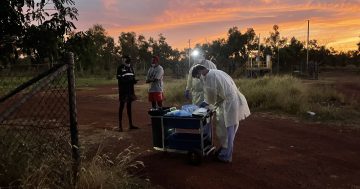Arianna Huffington* takes a lesson from a blockbusting movie and urges us to look up from our screens and engage with reality.
 With the awards season, as they call it in Hollywood, well under way I’m casting my vote for the best film of the year: Don’t Look Up, written and directed by Adam McKay.
With the awards season, as they call it in Hollywood, well under way I’m casting my vote for the best film of the year: Don’t Look Up, written and directed by Adam McKay.
It’s at once the funniest movie of the year and the most serious.
If you haven’t seen it yet there are spoilers to follow.
Don’t Look Up’s premise is simple: a massive, existentially destructive comet is hurtling toward Earth.
It’s a metaphor for climate change, but also for other challenges like our growing income inequalities.
The film shows how easy it is for people, including scientists, politicians and journalists, to be seduced by money and power.
The comet is discovered to contain trillions of dollars in rare earth minerals.
United States President, Janie Orlean, played with hysterical venality by Meryl Streep, announces: “What the world thought was an impending and terrifying danger turns out to be an astonishing opportunity.”
The film brilliantly shows how the noise of our technology-fuelled media landscape keeps us distracted and diverted.
Our addiction to our screens and our always-on culture has us perpetually drowning in the shallows, obsessed with the superficial and unable to marshal attention to go deep on solving our big problems.
As the moment of the comet’s impact approaches, the admonition: “Don’t look up” becomes a viral rallying cry by President Orlean.
“You know why they want you to look up? Because they want you to be afraid,” she says.
In fact, when we refuse to look up from our screens, we’re much more susceptible to being controlled by fear, to being divided, to having our valuable attention mined.
By taking our eyes off our screens, we can not only look up and take in the reality of what’s happening, but look in, to tap into our wisdom to do something about it.
Satire has always been one of the best weapons for challenging the status quo and getting people to see reality in a new way.
McKay follows in the tradition of great satirists like Jonathan Swift and Mark Twain — savage wit in the service of passionate conviction.
Humour also has the unique ability to cut through social-media fuelled misinformation and communicate essential truths.
McKay says: “What I’ve noticed is when… 500 people are together, and they’re laughing, there’s a high bar of truth.
It’s very hard to get people to laugh when something is false.”
Don’t Look Up comes after two years of a forced pause in which we’ve had more time to think about what we value.
What I love most about the movie is that it bears witness not just to the truth of the urgency of climate change, but to the truth of what’s most valuable in our everyday lives.
What we’re missing by not looking up, and not looking in.
As McKay and climate scientist, Ayana Elizabeth Johnson, write in The Guardian, unlike the characters in the movie, we’re the authors of our own story.
“Not every story is guaranteed a happy ending, even though that’s mostly what we see in movies.
“So we can’t just sit back and watch. We are not an audience. Like it or not, we are in this story,” they write.
While we’ve heard a lot about vaccines, masks and social distancing in the past two years, there’s been very little messaging on the huge impact that lifestyle factors like sleep, nutrition and movement can have on how vulnerable we are to the virus.
Not only does getting enough sleep boost our immune system, it also plays a big role in how much protection we get from vaccines.
One study found that those who had slept only four hours in the four nights before receiving the flu vaccine had less than half of the critical antibodies of those who weren’t sleep-deprived.
A recent study in the British Journal of Sports Medicine found that the “consistently inactive” were more likely to be hospitalised, more likely to be put in the ICU and more likely to die that those who exercised regularly.
A study by researchers from the University of North Carolina found that individuals with obesity were 46 per cent more likely to get COVID, 113 per cent more likely to be hospitalised and carried a 48 per cent higher risk of death.
Yes, weight loss is difficult, and that’s why Thrive’s behaviour change system is all about micro-steps.
As study lead author, Barry Popkin put it: “Any weight loss is a positive at nearly any weight level”.
We still absolutely need people to get vaccinated and boosted.
We also need to go upstream and focus on the modifiable factors that we know put us at higher risk not just of COVID, but a whole host of chronic illnesses.
Preparing for the next pandemic, or the next variant, shouldn’t just be about ramping up our supply of ventilators and expediting the process for approving new vaccines.
A vital part of shoring up our public health system is shoring up our personal health system — the small choices we make every day that make a big difference.
*Arianna Huffington is the founder and Chief Executive of Thrive Global; the founder of The Huffington Post, and the author of 15 books, including, most recently, Thrive and The Sleep Revolution.
This article first appeared on LinkedIn.












